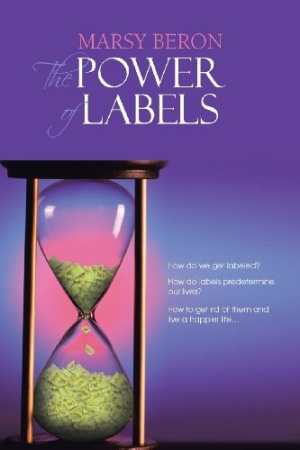The Power of Labels
How Do We Get Labeled? How Do Labels Predetermine Our Lives? How to Get Rid of Them and Live a Happier Life...
These personal stories of struggles with labeling encourage self-esteem and empathy through friendly advice.
In The Power of Labels, a self-help book with an encouraging tone, Marsy Beron discusses a range of ways people label themselves or are labeled by others, and the detrimental psychological effects this can have on children and adults.
The main theme is that labeling is something everyone does and everyone experiences; by being more aware of it, people can overcome its negative effects. Through a series of personal stories, Beron focuses on how labels are created for others by parents, coworkers, and spouses, and how that can influence people’s perceptions of themselves and their environments.
This approach to labeling is based on Gestalt psychotherapy principles, an existential philosophy that focuses on one’s present state, on assuming personal responsibility, and on understanding one’s social context and web of relationships. A former journalist, Beron later became a Gestalt psychotherapist. Here, she relies on many anecdotal experiences, not only from her own life but also from her clients and group therapy work, to offer advice. While the stories do help convey how routine labeling is, they all follow the same main theme, and this becomes repetitive.
Although the book is prefaced with a discussion of Beron’s educational background and training in psychotherapy in order to establish her expert credentials, the text focuses solely on these personal anecdotes. More scientific evidence to support the points would lend credibility to the author’s suggestions.
As Beron discusses difficult topics, she adopts a generally friendly tone and stresses how labeling can easily affect one’s self-esteem, often addressing her own struggles with lack of confidence. However, a few out-of-place phrases come across as sarcastic and harsh. For example, when discussing how parents deal with young children, the book suggests: “You may always wish to respond to the wishes of the little crybaby.”
There are other shifts in focus that confuse as well. At times, the book emphasizes how people can overcome the labels placed on them, but then it abruptly shifts to address labelers, such as parents, and the mistakes they make by outwardly labeling their children. The result is a message that becomes jumbled.
Several exercises are included to illustrate how one can overcome labels, but some are quite complex and unrealistic. For example, one exercise involves filling a backpack with heavy items and walking around with it for several days. Another is designed to last several hours over the course of a day in a group setting, which is likely not practical for most readers. Each exercise also includes an analysis of the benefit it will provide and a discussion of the point the exercise is seeking to highlight, ultimately rendering it unnecessary to carry out the actual activity.
The Power of Labels stresses how commonplace labeling is and the negative effect it can have on one’s behavior, but it doesn’t go far enough to provide in-depth, real-world solutions to avoid or overcome these effects.
Reviewed by
Maria Siano
Disclosure: This article is not an endorsement, but a review. The publisher of this book provided free copies of the book and paid a small fee to have their book reviewed by a professional reviewer. Foreword Reviews and Clarion Reviews make no guarantee that the publisher will receive a positive review. Foreword Magazine, Inc. is disclosing this in accordance with the Federal Trade Commission’s 16 CFR, Part 255.

